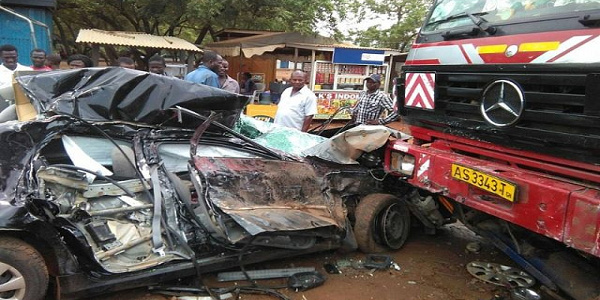Road accidents in Ghana remain a pressing concern, claiming thousands of lives and causing severe injuries annually. The increasing number of crashes has far-reaching social and economic implications, affecting families, communities, and overall national productivity.
According to the World Health Organisation (WHO), approximately 1.19 million people die globally each year due to road traffic crashes.
These injuries are the leading cause of death for children and young adults aged 5–29 years. Additionally, 92% of the world’s fatalities on the roads occur in low and middle-income countries, even though these countries have around 60% of the world’s vehicles.
More than half of all road traffic deaths too are among vulnerable road users, including pedestrians, cyclists, and motorcyclists. Road traffic crashes cost most countries 3% of their gross domestic product.
In line with global trends, Ghana’s statistics for 2023, as reported by the National Road Safety Commission (NRSC), recorded a total of 2,276 fatalities from road crashes. Of this figure, 1,806 were males, representing 79% of total deaths, while 470 were females, accounting for 21%.
This pattern was echoed in the first half of 2024. Out of a total of 1,219 pedestrians knocked down during this period, 978 (79%) were males, and 259 (21%) were females, showing a 1.9% decrease compared to the same period in 2023, which recorded 1,212 knockdowns.
The disproportionate number of male fatalities highlights a recurring trend observed over the years, reinforcing the notion that men are more vulnerable to fatal road accidents than women. Further analysis reveals that 322 of the deceased, making up 14%, were individuals below the age of 18, while 1,954, representing 86%, were adults above 18 years.
While road crashes pose a significant risk to young people, most fatalities involve adults.
According to a report by goddardlawwv.com, motor vehicle accident death rates are higher among male drivers in every age group.
Accidents involving male drivers, it said, are typically much more serious than accidents involving female drivers.
It notes that annually, men cause approximately 6.1 million car crashes per year, while women cause roughly 4.4 million. Nevertheless, the chances of females getting seriously injured or dying in accidents of identical magnitude is higher. Gender differences in the risk of death lessen as drivers get older, it added.
They attributed the higher rate of male fatalities to behavioral and occupational factors, adding that men are statistically more likely to engage in high-risk driving behaviors, such as speeding, reckless overtaking, and impaired driving.
Additionally, a large proportion of commercial drivers, who spend extended hours on the road, are men, further increasing their exposure to fatal crashes.
While men constitute the majority of fatalities, concerns also persist regarding the safety of children on Ghana’s roads. Factors like poor pedestrian infrastructure, unsafe crossings, and inadequate child restraints in vehicles contribute to these tragedies.
The NRSA has consistently emphasised the need for targeted interventions to reduce fatalities across all demographic groups.
It has called for intensified road safety campaigns to address the behavioral risks associated with male drivers, while also advocating for stricter enforcement of road regulations to mitigate reckless driving.
Authorities have also been urged to improve pedestrian infrastructure, enhance child safety awareness, and promote the use of appropriate safety gear for young passengers.
The United Nations General Assembly has set an ambitious target of halving the global number of deaths and injuries from road traffic crashes by 2030
As Ghana continues its efforts to curb road crashes, understanding demographic trends in fatalities is crucial for developing effective policies.
Through sustained measures, stronger stakeholder collaboration, and enhanced road safety education, the country can make significant progress in reducing road crash fatalities.
JKB/AE
You can also watch as John Boadu reveals how NPP blocked Afenyo-Markin from contesting Effutu seat:
